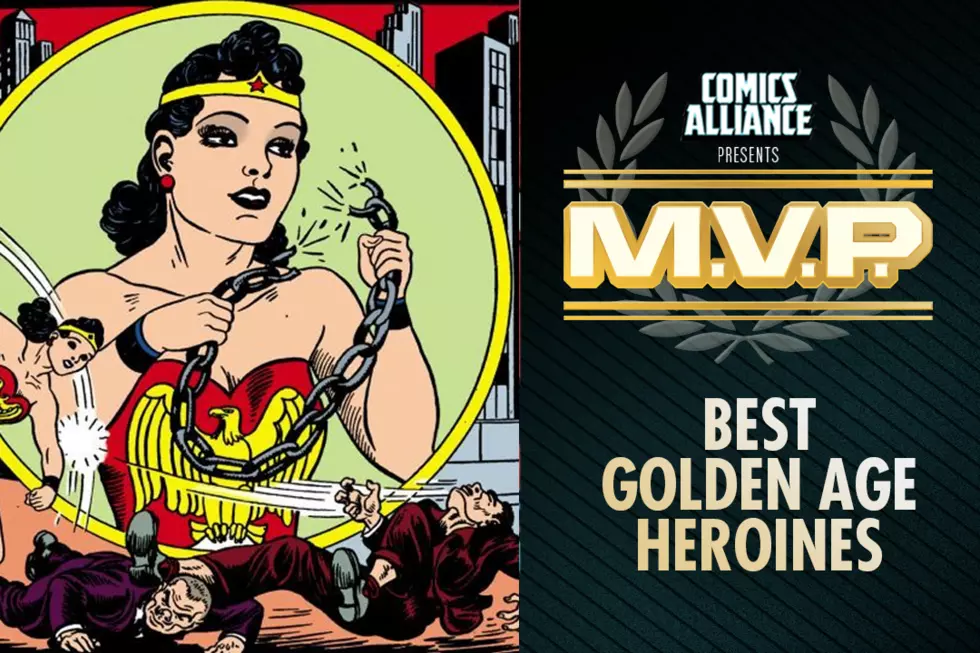
Gail Simone: The Comics Alliance Interview, Part One – Batgirl, Birds Of Prey, And Women In Refrigerators
Gail Simone, longtime comic book writer for DC Comics (and snarky Twitterer), is in the midst of a career evolution at the moment. Simone's comics work started with the Women in Refrigerators website, which was a commentary on how female characters are all-too-often mistreated in comics (named after the 1990s story in which Green Lantern Kyle Rayner discovers his girlfriend's body stuffed in his refrigerator). WIR became an important part of the discussion of how female characters are treated in superhero comics - a discussion that continues today. Simone's work on WIR led to a column at Comic Book Resources titled "You'll All Be Sorry" and the humor in that column in turn led to Simone working on Simpsons comics.
It was her entry into superhero comics, however, that permanently shifted Simeone's career. Although she worked for Marvel a bit, including a run on Deadpool and then Agent X, Simone has primarily made her home at DC over the last decade. Popular books like Birds of Prey, Secret Six, Wonder Woman, Batgirl, and others solidified Simone as super hero writer with an outspoken fan base.
Now Simone is in a brand new position: that of a non-exclusive freelancer. For many creators, this can be a difficult hustle, as the shift from guaranteed work minimums to having to look for gigs can be a struggle. Simone seems to be thriving, however. Between working on various Red Sonja projects at Dynamite and writing a Tomb Raider series at Dark Horse, Simone is also still working at DC, with a Vertigo series called Clean Room on the way and preparing to relaunch of fan-favorite Secret Six, which is in stores on December 3.
In part one of this in-depth two-part interview, Simone spoke with ComicsAlliance about Women in Refrigerators, women in comics, and her occasionally tense time at DC.
ComicsAlliance: So, I want to start at the beginning - women in refrigerators.
Gail Simone: Right.
CA: Was there ever a point when you were putting together the WIR list or talking about the characterization of women in comics that you started to get burnt out?
GS: I'm still doing it over a decade later. There's definitely times where fatigue sets in, there are times when you have to answer the same very clearly loaded questions for the thousandth time, and it gets a little wearying.
What's interesting to me about the site is, people bring their own baggage to it over and over. It never uses the words “sexism” or “misogyny,” that wasn't what the point was.
CA: What did you see as the point of WIR?
GS: The point was to ask a question. "Why are all these long-running female characters suddenly meeting these horrible fates?" And I didn't know the answer, so I asked as many people in the industry as I could find. Some argued the question, some agreed, but every one of them knew exactly what I was asking about immediately.
At the time, you know, female readership was low, female con attendance at comic cons was low, morale for female readers was low. And I kept seeing guys ask, "Why don't women read comics?" And for me, it felt that there was a connection between that and the fact that if you loved female superheroes, you had this endless parade of stories where the women were killed or de-powered, and they were never the focus of the story.
It felt symbolic, it felt textural. It felt like they were saying, okay, no one cares about Supergirl, no one cares about Batgirl, and so their stories rarely became about survival, they became about some dude getting revenge on their behalf.
CA: Did you expect the WIR project to still be a touchstone years later?
GS: No, I never expected WiR to be anything. I was happy to be just an anonymous poster on various message boards. But it immediately became this massive thing that everyone was talking about. It was in national newspapers, Harper's Bazaar did a story on it. It just became huge.
And it was very quickly weaponized. People writing articles were using it to call readers and creators “pigs.” There was literally a story that that was the whole point, the writer called the entire industry a bunch of pigs. My feeling was never that the industry was that vile, my feeling was that there just hadn't been any feeling that females were interested, and so all the content skewed that way, to that imagined audience. Which becomes self-fulfilling.
But it's odd how it's lived on, I have heard it numerous times in Hollywood, I've heard it in big editorial meetings, often the people using it have no idea I coined the phrase.
I think it's had a value in that even the most clueless writer is generally aware of it. They have to face that there are female readers and we have characters we care about as well. I've always joked that if you give Iron Man's armor a nose, it's a catastrophe, but for a long time, you could kill or de-power every female of note and if anyone brought it up, it was clearly overreacting.
CA: Do you think that a fair amount of the issues that comics has had with female readership is from ignorance rather than sexism?
GS: Oh, yeah, absolutely. I think there are very few, you know, Dave Sims out there who actually believe in their hearts that women have "no conscience, no morals, no sense of right and wrong." But there are a lot of guys who grew up reading these female-free comics, a lot of guys who were awkward around girls growing up. I prefer to believe that a lot of it is simply a lack of awareness. I have had some stunningly ignorant things said to me, with absolutely no hurtful intent, by guys who would probably consider themselves feminists. They would be shocked to be called misogynists, and it's not really the right word. They're just uninformed, many of them.
But make no mistake, there are some people with genuine problems with women, it can't all be blamed on lack of proximity.
CA: I think that "uninformed" is easier to deal with than "hostile" but a lot of times being confronted with reality can make even the uninformed hostile.
GS: Yes, the uninformed don't like to be told they are uninformed, absolutely not. We are all products of the idea that our perceptions are trustworthy. And I've seen some writers who call themselves feminist default to a turtle-shell protective mode when criticized even slightly on gender portrayals.
CA: Maybe this is still shifting even for you, but how do you deal with attempting to educate other creators about this stuff? In ways that won't be met with hostility, in particular.
GS: I have this term I made up, "mocktivism," wherein you make a point, but with some humor. A lot of people respond well to it, they know they're not being hit with atomic weapons, there's a bit of affection involved. But sometimes I do still get frustrated at people being deliberately obtuse. An example for me is the people still trying to deny the growing female audience.
CA: Which is a thing that keeps happening even as the numbers continue to support that the female audience is growing.
GS: I have an example of this. I was at a con in Calgary, in artist's alley. I was swamped the entire time, huge line, at least fifty percent female. Across from me is Agnes Garbowska, same deal. Next to me is Marcus To, huge line, at least half female. I am looking down this row and it is full of people, at least 40% female, in line for their favorite artists. I am happy. So I come out, and a guy is talking to a con organizer, and he says, "This is great, but I wonder why no women ever come to these things?”
He is SURROUNDED by women, clutching their books for autographs, buying prints… and he asks, "where are the women comics readers?”
There really is no way to respond to that.
CA: No, there isn’t.
GS: You can't go to a con and have your eyes open and deny it anymore.
CA: Well, and even people who see the attendance numbers from ReedPop and see that women's attendance is growing even faster than men's attendance will say that those women aren't there for comics.
GS: BUT THEY ARE.
CA: And even if that was true, to me that points to a failure on the part of comics publishers, not on the part of the women attending a con.
GS: This was the thing with me. When I started in comics, people were always trying to classify me as either/or. Either a writer who appealed to women or a writer who appealed to guys. This need to categorize was just exhausting. But I would have these big lines at the DC booth, and they would have a large percentage of females, and I swear, it was like looking at a monkey trying to figure out an iPad. The people would just shake their heads..."Wait, women read SUPERHERO comics?”
Publishers are at the heart of it. I want to praise them and applaud them for the attempts they are making to change right now, that's all good stuff, and it's making a difference. But I am still a little peeved they waited until there was literally no other choice to start caring about the female audience. We have Ms. Marvel selling out again and again, Marvel's number one selling book digitally. Harley Quinn is a huge hit. The new Batgirl is big, Captain Marvel is great outreach, all the buzz books have the scent of women on them somewhere.
I would be happy to have seen the last generation of guys in charge who don't attempt to court a diverse audience. I think it's time to send those people home.
CA: And they have both female creators and female characters.
GS: Right, and again, there are books with no female creators that have still managed to touch that audience. I don't need every book to have female creators, I don't care if there are books that appeal mostly to guy readers. I don't care if some books have cheesecake. I am fine with all of that. It's the not allowing anything else that makes me furious.
CA: I think that generation is being forced to deal with the economic realities of only catering to a limited audience for decades, finally, and maybe if nothing else the money factor will get through to them.
GS: Yeah, money for sure. Batgirl and Harley Quinn are the first DC hit books in a while that aren't starring Batman personally, really. But some of the attempts to reach the female audience have been really depressing to me.
CA: Like what?
GS: Oh, you know, for a long time there was this typical female lead character, and they were defined in sort of the terminology of the past, women who were broken in some fundamental way but still oversexualized and not really very female apart from appearance. A guy's idea of what a tough woman is. I always say, if a guy writes the same lead female character type over and over, we are not seeing their writing chops so much as their dating website wishlist.
Or you have a decent female lead, but you hedge your bets with making all the art as sexualized as possible. And you know, I wrote Birds of Prey with Ed Benes drawing it, so it has to go pretty far for me to get annoyed.
CA: I think that's why the "strong female character" trope has gotten increasing amounts of criticism recently. It's less about women as humans and more about "well, this is what you wanted, right?”
GS: Sure, there's a “strong female character” archetype that has become so generic that it doesn't even need Kate Beaton to make fun of it, it's already ridiculous. I think that's the difference between something like Kelly Sue [DeConnick’s] Captain Marvel and Generic Badass Bosom Lady. Kelly Sue is writing a strong woman, not a strong imagined archetype.
CA: So, shifting gears a little since you brought up BOP - the first I heard of you was while you were writing Agent X, which I loved, and then someone blew my mind by telling me you wrote a female team book at DC.
GS: Ha! I am very grateful to Marvel for giving me a shot at Deadpool and Agent X. [Former Marvel Editor in Chief] Joey Quesada never treated me with anything but care and respect. And I am happy, in some ways, that my first big work was essentially a walking penis. I think the fact that it was humorous was what kept me from being offered every girl book forever.
CA: I'm curious - if things had been swapped, what humorous book would you have wanted to write at DC and what group of women would you put together at Marvel?
GS: Well, that was the thing, I didn't want to do a humor book at DC at first. I had two concerns, I didn't want to be thought of only as a female writer, and I didn't want to be thought of as someone you chose when you wanted a "funny" comic. That rep of coming from humor comics takes a long time to get past.
But now, I'd love to write more fun heroes. I am tired to the bone of the dark, dark, darkness, it's just not compelling to me when everyone is doing it. I almost did an Inferior Five book, that would have been fun.
CA: But I would say most of your work has some humor to it - not all of it is "humor comics" but you do inject humor even in serious super hero work you do.
GS: It's a question of humanity. I talk about food and music a lot in my comics, there's a lot of gallows humor, sometimes slapstick humor. Because I am not motivated by the millionth plot about the Infinity Hat or whatever, I am interested in what these ridiculous worlds do to the people living in them. I think that was a big part of why BOP was successful, people wanted to hang out with those women.
When I started was a very strange time. People talk like I have been doing this forever but it's actually just over a decade. Most of the female writers at DC and Marvel had left. It was just me. If Marvel or DC had a panel, I was the only female. If there was a group photo, it was me and thirty dudes. It was actually very lonely at times. I knew there were readers out there who felt that same way, so BOP was about social things, women who loved and supported each other. Female friendships are still very rare in all media, and BOP was all about that. Part of that was them kidding each other, I think, so that's where humor seemed to fit naturally.
CA: So, as some readers may know, you and I worked together on BOP when I was an editor at DC. And as some may also know, things did not end all that happily between us what with the New 52 launching and the way those books and teams were decided upon at the time. It was definitely tumultuous, I think we can both agree. If you could've had complete control over Birds of Prey in the New 52, in retrospect would you have wanted that and if you would, what would you have wanted to do?
GS: That's true, I always thought you were a good editor but there were things going on that I didn't understand and still don't, really. The New 52 was thrust upon us with no warning and we had just relaunched BOP to great success. I remember I got a description of what the new BOP would be and I couldn't make any sense out of it.
CA: It's true - sales of the Brightest Day-related relaunch of BOP were pretty intensely high. We went to four printings of issue #1, I believe.
GS: Right, and I had heard nothing but joy from DC, they were very happy with the response. That sounds right, but my deal was never just about sales, I just wanted there to be a BOP book for what I felt sure was the growing female audience. That was important, I felt.
CA: And of course, what was difficult to talk about when I was on staff was that I just got a description of what the new BOP would be and told I should be happy that I got to keep my creative team.
GS: See, I didn't know that, either.
CA: Being an editor at that level is very much full of mixed loyalties, unfortunately.
GS: Sure, I was always naive about editing, I didn't really realize all the stuff you guys have to go through. With the New 52 version, you guys, with Duane [Swierczynski] writing, did some terrific action and great characters, I think Starling is the best new character in the New 52, but I did miss that buddy cop feel.
CA: Well, thank you - you know, I'm really proud of the work Duane did on that book and I love Starling dearly. But it was a rough situation in many ways.
GS: I think everyone was under a lot of pressure and things were being made up as we went along, but I still feel the New 52 was something that needed to happen, something needed to be done and I do appreciate the scope of it.
CA: Maybe the reason some books are hitting a stride now is that things feel a little more comfortable and worn in.
GS: I feel like now, it's settling in more, there's a lot more connectedness now. Last time I was at the DC offices, there was a real spirit of experimentation. My feeling was that a lot of people looked at BOP being a successful book and felt they knew how to replicate it...we saw a lot of books that tried, but most missed the mark. And I think it's the friendship, I really feel that's the core that made it work.
It's weird that this is the first we have ever talked about this.
CA: It is a little weird!
GS: I think BOP is an important book for DC and for the industry. I keep saying this, but I would love to have the Lumberjanes team come in and just re-invent it from scratch. I think often about pitching a new BOP, but I just don't know the characters anymore, and I don't want to take away from what others are building with them. It would be better with a new team.
CA: You're still working with DC, obviously, but do you feel like your relationship with the company has changed after all of the things that happened along the New 52 path, including BOP and your coming and going from Batgirl and whatnot?
GS: DC definitely was my home for a long time. Every assignment I took, I was thinking, what can this add to what DC is publishing, what can we do to make this universe better or more inclusive? And that led to me doing a lot of books I loved and a couple where I was simply mismatched.
In 2015, it's the first time I am thinking more along the lines of, "what deeply personal stories do I want to tell?" exclusively. The Batgirl thing was rough and weird, but it's in the past, I don't know to this day the full story behind all of it but it no longer feels relevant. The only time it comes up is if someone asks me directly, and it's such a complicated story that it's impossible to abridge into bite-size chunks.
I am tremendously happy with who I am working with now. [Editors] Mark Doyle on Secret Six and Shelly Bond on Clean Room, they are the perfect kinds of editors for me; smart, creative and supportive. I really do thank my lucky stars for them constantly.
I love the DCU with ridiculous passion, I love the characters, I love the creators who work there. I have huge respect and appreciation for Jim [Lee], Geoff [Johns], Diane [Nelson], Dan [DiDio] and Bob [Harras], all of whom have done something for me, personally, at some point that was incredibly meaningful and generous. But I am also having a wonderful time exploring what other companies bring to the dance.
Part two of this interview is coming soon.
More From ComicsAlliance
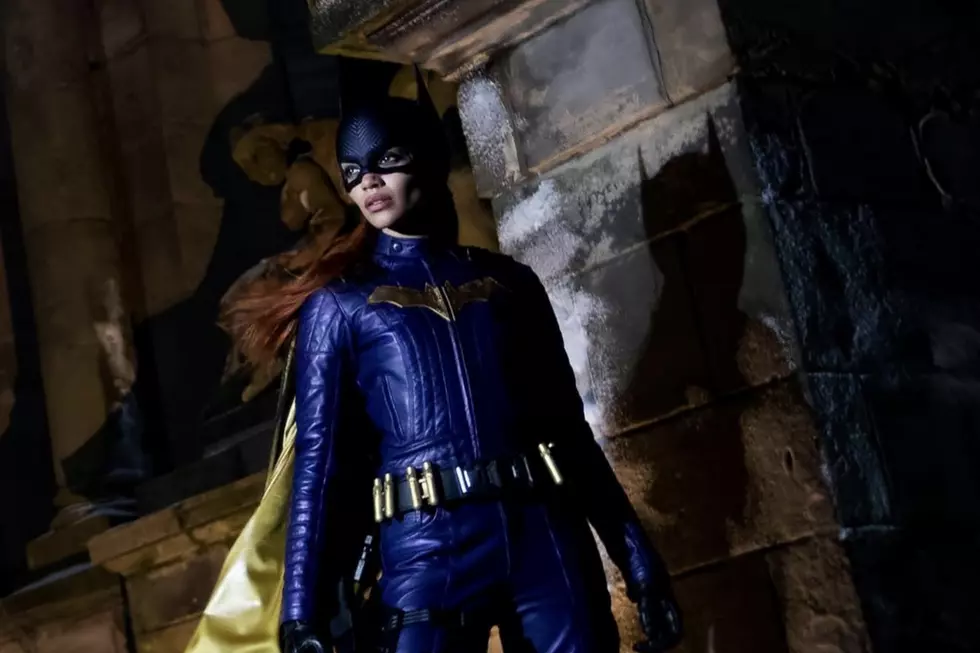


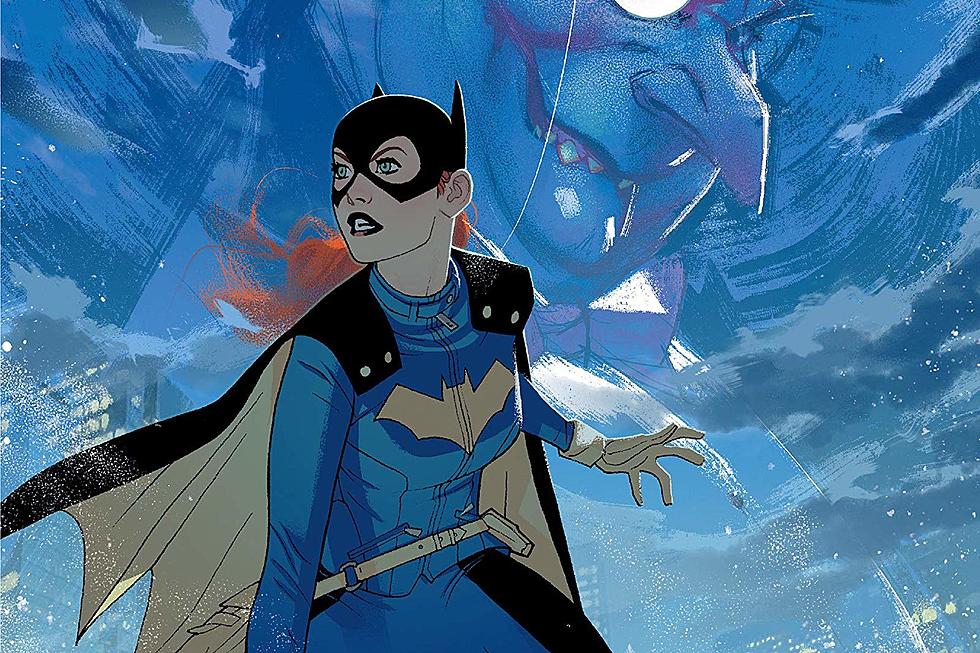
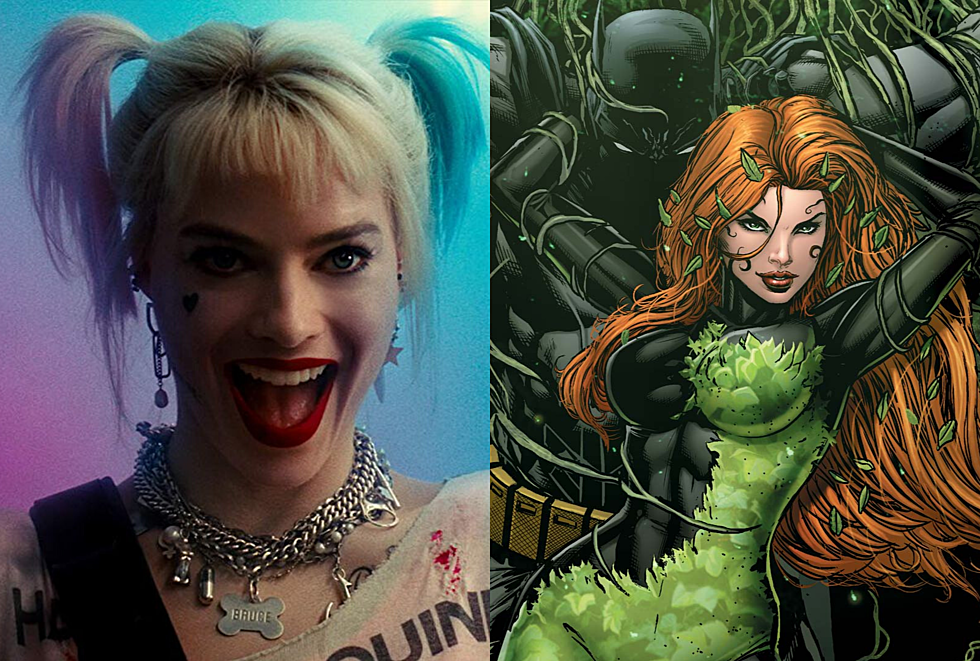

![When Everything Is Pink, Nothing Is Pink: Sarah Stern On Color And Creativity [Interview]](http://townsquare.media/site/622/files/2017/03/Cindersong-feat.jpg?w=980&q=75)

